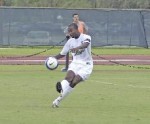Soccer star right at home as captain

For most freshmen, being named team captain might be overwhelming. For men’s soccer captain Yohance Marshall, it was familiar territory.
Marshall received the position during the 2005 season when he emerged as the vocal leader of the Bulls defense. He has since held the captain’s armband effectively and has been a major component in the team’s 10-4-2 record this season.
“I was captain on almost all of my youth teams and in high school,” Marshall said. “It wasn’t a big deal for me because I was already accustomed to playing that role. When I play, I like to talk to the guys around me. It makes my job easier.”
Marshall came to USF in 2005 and made an immediate impact on the Bulls defensive line. His presence and instinctive field vision earned him third team all-Big East honors and a permanent spot on coach George Kiefer’s back line.
“Yohance is a good leader and team player,” Kiefer said. “He plays his role in the defense well and does a good job of staying on the guys and keeping everybody where they need to be.”
Growing up in Malabar, Trinidad, soccer was a natural part of childhood for Marshall. He began playing at a young age and never stopped.
“Everybody in the community played soccer,” Marshall said. “It was natural instinct to play. It’s one of those things you do. It’s a part of the culture.”
The decision to come to USF was a big one – one that involved leaving his family behind in Trinidad.
“It was an opportunity to further my education and play the game I love,” Marshall said. “The climate here is similar to Trinidad, so that helped. Being away from my family and out on my own hasn’t been easy, though.”
The adjustment to playing American soccer wasn’t easy, either.
“It’s a whole culture difference,” Marshall said. “Back home, when you play, you play with a lot of passion. People always want to play, whether it’s indoor or outdoor. Here there is a different style of play that I wasn’t accustomed too.”
On the other hand, playing in America has provided Marshall the opportunity to play with players from all over the world. It’s also shown him how soccer is stylistically different around the globe.
“I like playing with people from everywhere,” Marshall said. “This team has people from Germany, Venezuela, Trinidad, Jamaica, and all over the U.S. Seeing all those different styles of playing the game gives you more experience.”
Marshall sat out for 11 matches of the 2006 season because of an injury. This year he’s managed to stay healthy and helped the Bulls maintain a spot in the nation’s top 30 by leading a defense that has only allowed 15 goals for the season.
As a defender, Marshall’s opportunities to score have been limited with only six shots on goal this season. He’s scored once, and it proved to be an important one as it allowed the Bulls to walk away from a road match against Florida Atlantic University with a 1-1 draw.
What Marshall brings to the team is something his teammates have come to admire and respect.
“It’s huge to have a guy that can lead with his ability on the field,” Bulls forward Jordan Seabrook said. “To have a player with his experience at such an critical position is important. He’s that guy that keeps everybody’s heads cool and playing to the best of their abilities.”
One of the keys to Marshall’s success has been his ability to lead by example.
“We all appreciate his abilities,” Seabrook said. “But everyone looks up to him. He’s the heart and soul of the team because he’s a good leader who can be effective vocally, but more so because he leads by example.”
Marshall’s leadership skills are about to face the toughest part of the college soccer season as the team prepares for the Big East championship that gets underway Nov. 7. Despite the increased pressure of this time of year, Marshall insists it’s no different from any other time in the season.
“Every game is big, so every game is just another game,” Marshall said. “I don’t think my job is difficult from the standpoint of hyping the team up because everybody knows those games are important. What we do on the field is my concern.”





